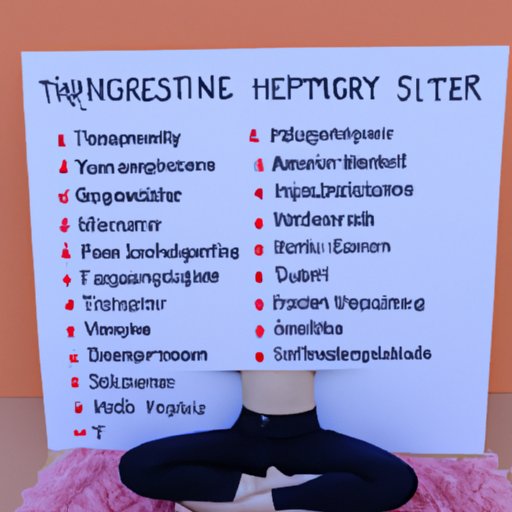Introduction
Hypersexuality is a condition characterized by excessive engagement in sexual fantasies, behaviors, and urges. It may involve compulsive masturbation, multiple affairs, or other behaviors that have a negative impact on the person’s life. People with hypersexuality often feel ashamed or embarrassed by their behavior, making it difficult to seek help or support.
Establish Healthy Boundaries
The first step in managing hypersexuality is to establish healthy boundaries. This means identifying all appropriate and inappropriate behaviors, as well as seeking support from a trusted friend or therapist. It is also important to create an environment where it is safe to talk about these issues without fear of judgment.
Identifying Appropriate and Inappropriate Behaviors
It is important to distinguish between behaviors that are considered acceptable and those that are not. Examples of appropriate behaviors include talking openly about sexual desires, engaging in consensual sexual activities, and setting limits on how much time should be devoted to sexual activities. Examples of inappropriate behaviors include engaging in sexual activities without consent, pressuring someone into engaging in sexual activities, and engaging in unprotected sex.
Seeking Support from a Trusted Friend or Therapist
Having the support of a trusted friend or therapist can make a huge difference in managing hypersexuality. A friend or therapist can provide a safe space to talk about feelings and set healthy boundaries. They can also offer advice on how to cope with urges and emotions related to hypersexuality. According to Dr. David Ley, a clinical psychologist and author of “The Myth of Sex Addiction”, “It’s important for people to understand that they don’t have to face this issue alone, and that there are resources available to help them manage their condition.”
Practice Self-Compassion
It is important to practice self-compassion when dealing with hypersexuality. This means acknowledging feelings and engaging in self-care activities such as yoga, meditation, journaling, or spending time in nature. These activities can help reduce stress, which can lead to more constructive ways of coping with hypersexuality.
Acknowledging Feelings
People with hypersexuality often experience intense feelings such as shame, guilt, and anxiety. It is important to acknowledge these feelings and find ways to express them in a healthy way. This could include talking to a trusted friend or therapist, writing in a journal, or engaging in creative activities.
Engaging in Self-Care Activities
Self-care activities can help reduce stress and provide an outlet for expression. Examples of self-care activities include yoga, meditation, journaling, and spending time in nature. According to a study published in the Journal of Behavioral Medicine, “self-care activities can help reduce symptoms of depression, anxiety, and stress, which can help manage hypersexuality.”
Avoid Triggers
It is important to identify potential triggers and take steps to avoid them. Triggers can be external, such as certain people or places, or internal, such as certain thoughts or emotions. Identifying and avoiding triggers can help manage hypersexuality.
Identifying Potential Triggers
It is important to identify potential triggers and become aware of how they affect behavior. This can be done through journaling, talking to a therapist, or observing patterns in behavior. Once potential triggers have been identified, it is important to take steps to avoid them.
Taking Steps to Avoid Them
Once potential triggers have been identified, it is important to take steps to avoid them. This could include avoiding certain people or places, changing routines, or practicing mindfulness techniques. According to a study published in the International Journal of Mental Health and Addiction, “avoiding triggers can help reduce the frequency and intensity of hypersexual behaviors.”
Find New Hobbies
Finding new hobbies can help redirect energy away from hypersexual behavior. This could include joining hobby groups, taking up sports, or volunteering. Finding new interests can help reduce boredom and fill free time that might otherwise be spent engaging in hypersexual activities.
Joining Hobby Groups
Joining hobby groups can be a great way to meet new people and explore new interests. These groups can provide a safe environment to connect with others and share experiences. Examples of hobby groups include book clubs, art classes, or cooking groups.
Taking Up Sports or Volunteering
Taking up sports or volunteering can be a great way to stay active and engage with the community. Participating in sports can also provide an outlet for physical activity, while volunteering can provide a sense of purpose and fulfillment. According to a study published in The American Journal of Psychiatry, “engaging in positive activities can help reduce the urge to engage in hypersexual behaviors.”
Seek Professional Help
Seeking professional help can be beneficial for those struggling with hypersexuality. A therapist can help identify underlying causes and develop strategies to cope. Therapy can also provide a safe space to talk about feelings and establish healthier habits.
Understanding Underlying Causes
A therapist can help identify any underlying causes of hypersexuality, such as trauma or mental health issues. Understanding the root cause of the behavior can help develop strategies to cope and reduce the frequency of hypersexual behaviors.
Developing Strategies to Cope
A therapist can also help develop strategies to cope with hypersexuality. This could include cognitive-behavioral therapy, mindfulness techniques, or dialectical behavior therapy. According to a study published in The Psychotherapy Networker, “therapy can help reduce shame and guilt associated with hypersexuality and provide tools to manage urges and emotions.”
Conclusion
Hypersexuality can be a difficult condition to manage, but there are strategies that can help. Establishing healthy boundaries, practicing self-compassion, avoiding triggers, finding new hobbies, and seeking professional help can all help reduce the frequency and intensity of hypersexual behaviors. With the right support, it is possible to manage hypersexuality and live a fulfilling life.
(Note: Is this article not meeting your expectations? Do you have knowledge or insights to share? Unlock new opportunities and expand your reach by joining our authors team. Click Registration to join us and share your expertise with our readers.)
